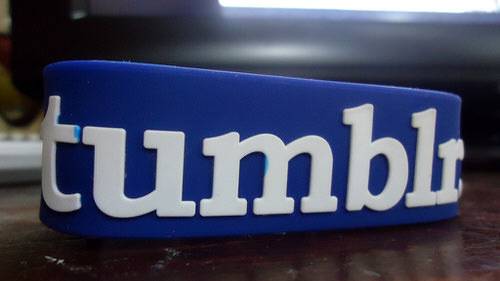
Yahoo’s plans to make Tumblr more family friendly hit a snag this weekend, after a user uprising forced CEO David Karp to backtrack on the platform’s unpopular new adult content quarantine. But Tumblr itself dodged a bullet at the same time.
Last week, Tumblr quietly imposed a sort of blackout on “adult content” tags, from the obvious “sex,” “porn” and “BDSM,” to the arbitrary seeming “gay,” “lesbian,” and “depression.” In practice, that meant that any and all blogs that mentioned one of these terms were rendered invisible to anyone looking for them via search engines or Tumblr’s own “explore” function. Strangely enough, other sex-related tags like “asshole” and “necrophilia” stayed visible.
That move cut off what we can safely say were a lot of blogs from just for mentioning one of the banned tags at some point in time. (Back in April, analytics firm SimilarGroup found that 11.4% of Tumblr’s 200,000 most-visited domains were adult blogs, although it’s not clear how it classified “adult,” nor how that ratio holds up among the remainder of Tumblr’s 126 million other blogs.) In this case, the net it cast was particularly wide: Even your primarily safe-for-work Tumblr blog—the one that’s filled with pictures of your dog and what you had for lunch—would have been blacklisted thanks to that six-month-old post that touched on porn, or even just your battle with depression.
User outrage got bad enough that at least 20,000 users signed a Change.org petition that complained the blacklist was “shunning people off of Tumblr.”
Eventually, Karp had to make a statement rescinding the blackout. The arbitrary tags are still blocked on mobile (Karp blamed the Apple store’s strict guidelines and promised a better solution soon), but NSFW content is back to being an on-off toggle that works like an honor system for racy bloggers. To wit, if your blog isn’t safe for work, you do the right thing and label it, which allows other Tumblr users to ignore it.
So What Really Happened?
The real question is, why would Tumblr ban a bunch of arbitrary tags in the first place? Why cut out porn, LGBTQ issues, and depression in one fell swoop? Tumblr denies any interference by its corporate parent, instead blaming the Apple store for its heavy-handedness.
“The reason you see innocent tags like #gay being blocked on certain platforms is that they are still frequently returning adult content which our entire app was close to being banned for,” Karp wrote.
Even if that’s the case, it’s difficult to believe that Yahoo’s influence—direct or indirect—played no role at all here. Otherwise, why would Tumblr also block posts with these “adult” tags from being indexed on search engines and made available in other non-mobile environments? Karp’s explanation also doesn’t have an answer for why some users’ blogs were being temporarily flagged as NSFW without their knowledge—on all platforms.
At the time of the acquisition, bloggers reported that Marissa Mayer suggested Tumblr’s porn could stick around, but perhaps that was just wishful thinking. Yahoo has never made an effort to hide its “family friendly” values. It only makes sense that it would want to apply those values to its empire across the board.
Tumblr’s crackdown was certainly no surprise to 170,000 Change.org petitioners who feared the Yahoo deal would change the blogging platform for the worse, or at least drastically limit the freedom Tumblr users were accustomed to.
While we don’t know what its parent company actually asked, or what Yahoo corporate desires Tumblr’s management might have tried to anticipate, in the end, Tumblr’s decision was to reverse the decision. To Tumblr, users are still the boss. And here’s why that could spell trouble for Yahoo.
Two Views Of Tumblr
Whether Yahoo likes it or not, adult content is a huge part of what makes Tumblr useful to its audience. It’s not just porn or nudity, although that’s still a big part of how its largely pseudonymous members choose to use the platform. And what of it?
Tumblr is famous for hosting a community of people who vocally champion rights for LGBTQ people and publicize mental health issues once kept behind closed doors. The ability to have a pseudonymous Tumblr username that isn’t tied to email, paired with the ability to search Tumblr by any word or topic, helps people to realize they’re not alone. The sheer number of petitioners shows the importance of Tumblr as a community for topics that others might classify as “adult.”
However, Tumblr’s search-by-tag mechanism makes it easy for pornographers to shock unsuspecting users with porn. The #gay tag is full of LGBTQ activism, but also dick pics. The #depression tag can be a helpful haven for suffering people, but it also includes graphic photos of slashed wrists. One great example of users fighting back is the “Reclaiming the Latina tag” blog—a Tumblr written by Latinas tired of finding porn of Hispanic women when they search for Tumblr posts by fellow Latinas.
Tumblr’s tagging system does a great job of delivering porn to people who aren’t looking for it. But removing tags like #gay, #depression, or even #latina won’t fix that. As Karp wrote in his apology, Tumblr is going to attempt more “intelligent” filtering to separate the wheat from the chaff.
This isn’t the first time users have threatened to leave a social platform if something changed. People have been making the same claims about leaving Facebook for years. But while concerns about Facebook privacy seem to always be bundled in a pile of “what-ifs,” Tumblr users’ worries are immediate and real. If adult content is made to go away, or even severely restricted, they’d have little use for it.
Tumblr thought better of throwing away the gay rights baby with the gay porn bathwater. Like its users, it knows there ought to be a better way.
Photo by Flickr user joshwept

















